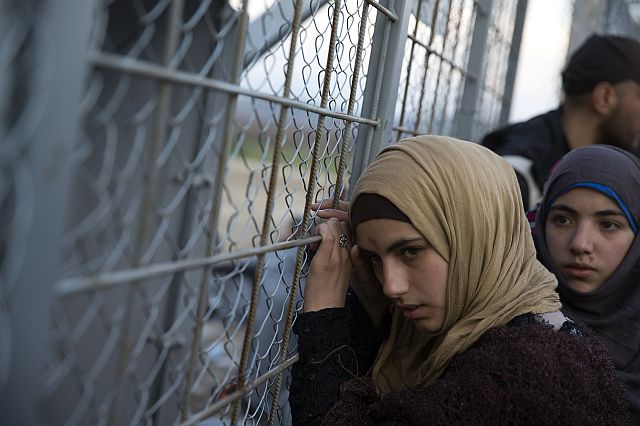
A young Syrian woman, one of the thousands of migrants heading to the Balkans, leans on the chain-link fence separating them from Macedonia, at the Greek border station of Idomeni. (AP Photo)
Thousands stuck at Greek border
Idomeni, Greece — Macedonian police fired tear gas and stun guns Monday as several hundred Iraqi and Syrian refugees, frustrated at days of delays in crossing the Greek-Macedonian border, broke down a gate on a nearby rail crossing.
Thousands of people have been stuck for days at Greece’s northern border, overflowing from a packed refugee camp at Idomeni into the surrounding fields as they waited for Macedonian authorities to let them continue their trek through the Balkans. Only a tiny trickle of people from specific countries have been allowed to cross every day.
The migrants had earlier pushed their way past Greek police to reach the gate, chanting “Open the border!” and “We want to go to Serbia!” the next country north on the Balkan migration route leading into Western Europe.
No arrests or injuries were reported in Monday’s clashes.
About 6,500 Syrian and Iraqi refugees are camped at or near the Idomeni crossing, with another 500 moved to a hastily erected camp on a small concrete landing strip 20 kilometers (13 miles) away.
Macedonian police opened the crossing to receive about 50 people just before midday Monday, after keeping it closed for eight hours, but closed it again after the clashes.
The Idomeni crossing is a key point on the mass migration route that has prompted a major Europe-wide crisis. More than a million people have entered the continent since January 2015 — mostly arriving in small smugglers’ boats from Turkey on Greece’s eastern Aegean Sea islands.
After first sending welcoming messages, European authorities are now struggling to handle the situation. Hungary has fenced off its borders, refusing to accept any migrants, and other eastern European countries say they will not take in anyone under an EU refugee-sharing deal. In recent weeks Austria — at the end of the
Balkan corridor — has severely restricted the inflow of migrants, causing a domino effect through the Balkans. Many countries are now refusing to let Afghan refugees in, although UN authorities say no one has explained to them who made this decision or why.
Macedonia has said it will only allow in as many people as Serbia accepts. This has led to a huge bottleneck in Greece, where authorities say more than 22,000 people are stuck and hundreds more are arriving every day.